 Memory card kings Lexar Media have teamed up with videogame big boys, Ubisoft, in a cunning piece of cross-market publicity.
Memory card kings Lexar Media have teamed up with videogame big boys, Ubisoft, in a cunning piece of cross-market publicity.
From 4th April to 15th June, 2005, purchasers of select 1GB and 2GB Lexar JumpDrive USB flash drives will find themselves the lucky owners of a pre-loaded single game level of Tom Clancy’s Splinter Cell Chaos Theory for the PC, along with other specially created PC game content.
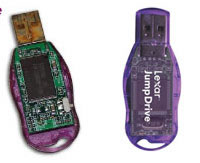 Described as a “major value-add promotion” it looks more like the unexciting equivalent of a magazine freebie cover disk to us, but Theresa Boldrini, Lexar Director of Retail Marketing, can’t hold back her excitement:
Described as a “major value-add promotion” it looks more like the unexciting equivalent of a magazine freebie cover disk to us, but Theresa Boldrini, Lexar Director of Retail Marketing, can’t hold back her excitement:
“This promotion with Ubisoft represents a breakthrough in the convergence of USB flash drive technology tied to a highly anticipated new game title,” she enthused.
“By partnering with one of the world’s largest and most respected videogame publishers, we’re able to provide consumers with unique, value-add content while conveying alternative uses for our JumpDrive products. It’s also an ideal way for Lexar to stand out among other USB flash drive manufacturers as we continue our drive to build retail presence in the software specialty and gaming channels.”
Tom Clancy’s Splinter Cell Chaos Theory is Ubisoft’s third installment of the popular Splinter Cell franchise and the Lexar promotion will be accompanied by all the usual big bits of in-store cardboard, as well as what’s described as a “colourful promotional burst” on the JumpDrive packaging.
As well as the single game level for PC, purchasers of select Lexar 1GB and 2GB JumpDrive products can expect to find pre-installed branded gaming wallpapers for the PC, a game screensaver and a “Strategy Guide” provided by Prima.
 And if all that wasn’t enough, a special Lexar promotion will offer consumers a free Tom Clancy’s Splinter Cell Chaos Theory t-shirt with the purchase of another Lexar product (be still my bearing heart!).
And if all that wasn’t enough, a special Lexar promotion will offer consumers a free Tom Clancy’s Splinter Cell Chaos Theory t-shirt with the purchase of another Lexar product (be still my bearing heart!).
Although we’re a little under-whelmed by this offering (there’s nothing particularly new about memory cards coming with pre-installed software), it may get interesting if other devices take up the theme.
Manufacturers stuffing their hard disk based DVD recorders full of Hollywood blockbusters may get an edge over the rivals, in much the same way as PC retailers crank up the bundled software.
And with hard disk based mobile phones edging ever closer to the mainstream, the devices of the future could come preloaded with a bonanza of freebies, extras, demos and adverts and other such promotional guff.
Doesn’t that sound, err, great?
 History will be made in a small corner of Wales today when the residents of two Carmarthenshire villages – situated on either side of the River Tywi – switch to digital-only TV.
History will be made in a small corner of Wales today when the residents of two Carmarthenshire villages – situated on either side of the River Tywi – switch to digital-only TV. To help smooth the transition, a helpline was set up for residents’ teething problems, with one-to-one support made available to the elderly.
To help smooth the transition, a helpline was set up for residents’ teething problems, with one-to-one support made available to the elderly. There are concerns, however, that these fancy-pants new digi-boxes could be a problem for the elderly and those on poor incomes. The government is discussing with charities about how to protect the vulnerable while promising not to authorise a complete switchover until support measures are in place.
There are concerns, however, that these fancy-pants new digi-boxes could be a problem for the elderly and those on poor incomes. The government is discussing with charities about how to protect the vulnerable while promising not to authorise a complete switchover until support measures are in place.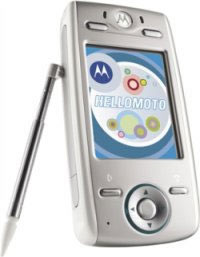 After the humiliating no-show of their much hyped (and currently in-limbo) iTunes phone at CeBIT earlier this month, Motorola have hit back with two new music phones.
After the humiliating no-show of their much hyped (and currently in-limbo) iTunes phone at CeBIT earlier this month, Motorola have hit back with two new music phones.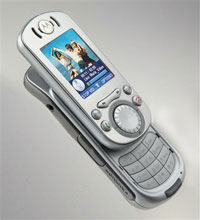 Sporting a ‘slider’ form factor, the E725 is a music player-cum-smartphone featuring a 1.9″ display (176 x 220 pixels resolution) with dedicated music keys, 5-band graphic equaliser and dual stereo speakers with virtual surround sound.
Sporting a ‘slider’ form factor, the E725 is a music player-cum-smartphone featuring a 1.9″ display (176 x 220 pixels resolution) with dedicated music keys, 5-band graphic equaliser and dual stereo speakers with virtual surround sound. Research carried out on by Infosecurity Europe has revealed that 92% of people were willing to freely dish out all the personal information needed to steal their identity in exchange for the chance to win a theatre ticket.
Research carried out on by Infosecurity Europe has revealed that 92% of people were willing to freely dish out all the personal information needed to steal their identity in exchange for the chance to win a theatre ticket. When they were told that it was a combination of their pets name and mothers maiden name, they were asked what they thought their stage name would be. Like a bunch of chumps, ninety four percent (94%) of respondees then blabbered out their mother’s maiden name and pet’s name.
When they were told that it was a combination of their pets name and mothers maiden name, they were asked what they thought their stage name would be. Like a bunch of chumps, ninety four percent (94%) of respondees then blabbered out their mother’s maiden name and pet’s name. Incredibly, the researchers did not give any verification of their identity, offering only a trusty clipboard and the offer of the chance to win a voucher for theatre tickets.
Incredibly, the researchers did not give any verification of their identity, offering only a trusty clipboard and the offer of the chance to win a voucher for theatre tickets. A British company has unveiled its cunning plan to roll out high-speed wireless networks and location-based services using street lampposts.
A British company has unveiled its cunning plan to roll out high-speed wireless networks and location-based services using street lampposts. Shrier believes that revenue could be generated by persuading companies to store their information on lampposts, paying Last Mile whenever someone accesses data using the MagicBook.
Shrier believes that revenue could be generated by persuading companies to store their information on lampposts, paying Last Mile whenever someone accesses data using the MagicBook. Microsoft has agreed – with all the enthusiasm of a child being made to eat spinach – to adopt all the “main changes” requested by the European Commission to its new version of Windows without Media player components.
Microsoft has agreed – with all the enthusiasm of a child being made to eat spinach – to adopt all the “main changes” requested by the European Commission to its new version of Windows without Media player components. Horacio Gutierrez, a lawyer for Microsoft, was clearly not too happy, telling Reuters that the company has “some misgivings about the chosen name, as we fear it may cause confusion for consumers about the product, but we will adopt the Commission’s name in order to move forward and accelerate the pace of the implementation process.”
Horacio Gutierrez, a lawyer for Microsoft, was clearly not too happy, telling Reuters that the company has “some misgivings about the chosen name, as we fear it may cause confusion for consumers about the product, but we will adopt the Commission’s name in order to move forward and accelerate the pace of the implementation process.” And there’s more! Microsoft are also in disagreement with the EU over plans to appoint a trustee to monitor Microsoft’s compliance (or the complete lack of) – if the company fail to comply with the Commission’s decisions, they could face a daily slapdown of up to US$5 million – the equivalent of a cup of coffee in Bill Gates’ world.
And there’s more! Microsoft are also in disagreement with the EU over plans to appoint a trustee to monitor Microsoft’s compliance (or the complete lack of) – if the company fail to comply with the Commission’s decisions, they could face a daily slapdown of up to US$5 million – the equivalent of a cup of coffee in Bill Gates’ world.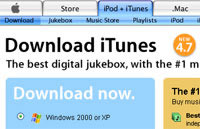 New figures released by the BPI (British Phonographic Industry) confirm that UK music fans are the numero uno, mad-for-it music buyers in the world, with each tune-loving Brit buying on average 3.2 CDs per person per year.
New figures released by the BPI (British Phonographic Industry) confirm that UK music fans are the numero uno, mad-for-it music buyers in the world, with each tune-loving Brit buying on average 3.2 CDs per person per year. It also raises questions about recent BPI lawsuits against alleged P2P file-swappers and the promotional role the networks may be playing.
It also raises questions about recent BPI lawsuits against alleged P2P file-swappers and the promotional role the networks may be playing. With album bundles and sales of digital EPs also doing good business in the UK, the Official UK Charts Company estimate that the total UK market for downloads topped 9 million units in 2004.
With album bundles and sales of digital EPs also doing good business in the UK, the Official UK Charts Company estimate that the total UK market for downloads topped 9 million units in 2004. An updated version of the hugely popular Voice-over-IP (VoIP) application Skype has been released.
An updated version of the hugely popular Voice-over-IP (VoIP) application Skype has been released. The soaraway Luxembourg-based company has so far signed up 29 million registered users for its free peer-to-peer based Net phone calling, making it one of the fastest-growing services on the Net.
The soaraway Luxembourg-based company has so far signed up 29 million registered users for its free peer-to-peer based Net phone calling, making it one of the fastest-growing services on the Net.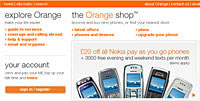 Mobile operator Orange has announced a GSM-based tracking service which it claims is both cheaper and easier to use than GPS technology.
Mobile operator Orange has announced a GSM-based tracking service which it claims is both cheaper and easier to use than GPS technology. Electronic Tracking Systems (ETS), makers of battery powered security tracking devices under the mtrack brand, is one of the first to pilot the product.
Electronic Tracking Systems (ETS), makers of battery powered security tracking devices under the mtrack brand, is one of the first to pilot the product. Channel Five yesterday became the first UK broadcaster to launch a legal video download store, offering DVD-quality downloads of some of the most popular features of its flagship car show, Fifth Gear, from its Web site.
Channel Five yesterday became the first UK broadcaster to launch a legal video download store, offering DVD-quality downloads of some of the most popular features of its flagship car show, Fifth Gear, from its Web site.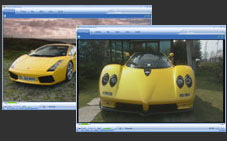 Powering the UK’s first legal video downloads store is a system developed by 7 Digital, the company behind download stores for a raft of leading music companies including Universal and EMI.
Powering the UK’s first legal video downloads store is a system developed by 7 Digital, the company behind download stores for a raft of leading music companies including Universal and EMI.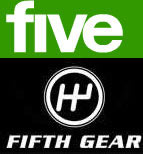 Legal music download sites have become hugely popular in recent years, but TV companies have so far not used the same technology to put programmes online – despite British viewers being the
Legal music download sites have become hugely popular in recent years, but TV companies have so far not used the same technology to put programmes online – despite British viewers being the